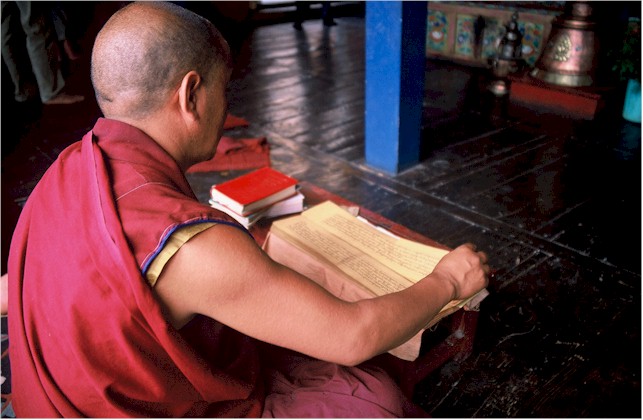Gelug Monastic Education
25 Mar
Picture taken from nickwinter.com
I heard of fascinating stories of how rigorous and rewarding the monastic education system can be within Gaden monastery. So, I did a little bit of research to find out more about it.
From what I know, the entire education system culminates with the Geshe examinations. Geshe is Tibetan derivative of the Sanskrit term, Kalyanamitra and that translates to ‘virtuous friend’. It is basically an academic degree that is awarded to monks after a grand dialectical examination every year for those completing their monastic studies. Monks have to study between 12 to 40 years of mainly memorizing scriptural texts and honing one’s comprehension of these texts through dialectical debates.
The Geshe degree is awarded in 4 categories, Dorampa, Lingtse, Tsorampa and Lharampa. The first two categories are awarded to candidates that were examined within their own college, for example Gaden Shartse. The combined assembly of Gaden Shartse and Jangtse examine and award candidates with the third category, Tsorampa. The Three Great Monasteries of Gaden, Sera and Drepung would finally award the highest title of Geshe Lharampa during the annual Great Prayer Festival, which is also attended by the Dalai Lama as well.
The Geshe examinations are based on the Five Topics, which are on the Abhidharma, Prajnaparamita, Madhayamaka, Pramana and Vinaya. Abhidharma is a study of epistemology or ‘higher knowledge’ and the root Indian text is the Abhidharmakosa or Treasury of Abhidharma by Vasubandhu. Prajnaparamita or the Perfection of Wisdom studies is based on the root text of Abhisamalayamkara or Ornament of Realization attributed to Maitreya as transmitted to Arya Asanga. This text examines the Perfection of Wisdom Sutras and gives a detailed overview of the Mahayana path and worldview. Then, the Madhyamaka studies are based on the Chandrakirti’s Madhyamakavatara or Introduction to the Middle Way. This text is the definitive guide to Nagarjuna’s seminal Treatise of the Middle Way, which forms the philosophical foundation of the Mahayana tradition.
Pramana is the Sanskrit word for Buddhist Logic and its root text is Dharmakirti’s Pramanavartika or Commentary on Valid Cognition. This text serves as the main guide to Dignaga’s seminal Compendium on Valid Cognition. Finally, the Vinaya relates to monastic morality and the root text for Vinaya studies is the Vinaya Sutra by Gunaprabha. Instead of referring directly to these texts, monks follow several systems of excellent Tibetan commentaries. Gaden Jangtse, Sera Je and Sera Tantric College use textbooks authored by Jetsunpa Chokyi-gyeltsen (1469-1544) Gaden Shartse, Drepung Loseling and Drepung Tantric College uses textbooks by the 15th Gaden Tripa, Panchen Sonam Drakpa (1478-1554). Drepung Gomang and Drepung Deyang use textbooks by Kunkyen Jamyang Zheypa (1648-1721). The remaining Sera May uses textbooks written by Kaydrub Tendarwa (1493-1568).
Although written by different authors, these commentaries differ only on the finer aspect of interpretation. Therefore, they are by no means contradictory or divergent in any way. What have been listed are the main books that monks use to study in order to become a Geshe. Besides these textbooks, all Gelug monks also study the seminal writings of Lama Tsongkhapa and his two heart sons of Gyaltsab Je and Khedrub Je.
This overview is by no means an exhaustive explanation but just a brief introduction of the traditional monastic education provided within Gelug monasteries. The Gelug education system is by far the most developed in terms of its scriptural studies. On the other hand, such studies are actually meant as a tool to aid the contemplative aspect of Buddhist practice. Hence, some monks who were awarded Geshes, decide to enter into deep retreat. While, other monks decide to repay the kindness of their teachers and the monastery by pursuing a teaching career of educating a whole new generation of monks.
Sources :-
http://en.wikipedia.org/wiki/Geshe
http://www.thlib.org/#!essay=/dreyfus/drepung/monasticed/s/b5






Praise _/_ to all great geshe!!!!
Yes, especially Geshes who meditate and teach with sincerity. They pass on the lineage to the next generation of monks and practitioners.
You are the worst author